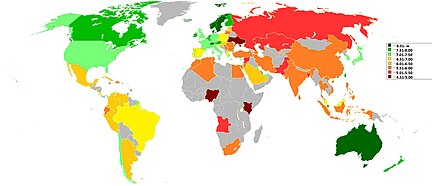

This article needs to be updated. Please help update this article to reflect recent events or newly available information. (April 2017)
|

The where-to-be-born index (previously called the quality-of-life index, abbreviated QLI) was an index last published by the Economist Intelligence Unit (EIU) in 2013, which aimed to measure which country would provide the best opportunities for a healthy, safe and prosperous life in the years after its publication.[1]
It was based on a method that combines the results of subjective life-satisfaction surveys with the objective determinants of quality of life across countries as well as forecasts for economic growth.
The index calculated for 2013 includes data from 80 countries and territories. The survey used ten quality of life factors along with forecasts of future GDP per capita to determine a nation's score.[2]
The life satisfaction scores for 2006 (on a scale of 1 to 10) for 130 countries (from the Gallup Poll) are related in a multivariate regression to various factors. As many as 11 indicators are statistically significant. Together these indicators explain some 85% of the inter-country variation in life satisfaction scores. The values of the life satisfaction scores that are predicted by the indicators represent a country's quality of life index. The coefficients in the estimated equation weight automatically the importance of the various factors. The estimated equation for 2006 can be utilized to calculate index values for year in the past and future, allowing for comparison over time as well across countries.[3]
The independent variables in the estimating equation for 2006 include: